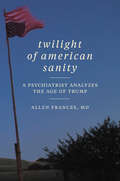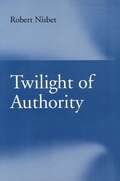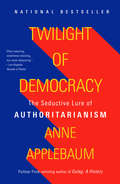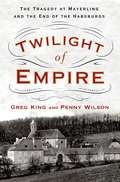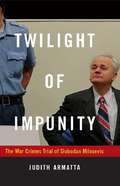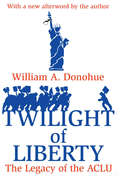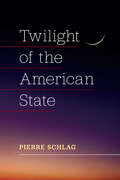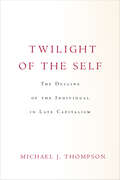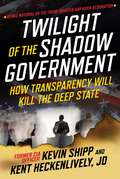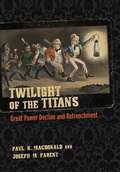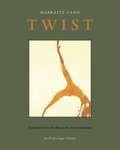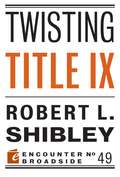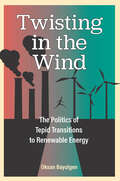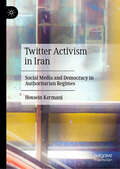- Table View
- List View
Twilight of American Sanity: A Psychiatrist Analyzes the Age of Trump
by Allen FrancesA landmark book, from “one of the world’s most prominent psychiatrists” (The Atlantic, June 2017): Eminent psychiatrist Allen Frances analyzes the national psyche, viewing the rise of Donald J. Trump as darkly symptomatic of a deeper societal distress. Equally challenging and profound, Twlilight of American Sanity makes sense of our time and charts the way forward.It is comforting to see President Donald Trump as a crazy man, a one-off, an exception—not a reflection on us or our democracy. But in ways I never anticipated, his rise was absolutely predictable and a mirror on our soul. … What does it say about us, that we elected someone so manifestly unfit and unprepared to determine mankind’s future? Trump is a symptom of a world in distress, not its sole cause. Blaming him for all our troubles misses the deeper, underlying societal sickness that made possible his unlikely ascent. Calling Trump crazy allows us to avoid confronting the craziness in our society—if we want to get sane, we must first gain insight about ourselves. Simply put: Trump isn’t crazy, but our society is. –from TWILIGHT OF AMERICAN SANITYMore than three years in the making: the world's leading expert on psychiatric diagnosis, past leader of the American Psychiatric Association’s DSM (“the bible of psychology”), and author of the influential international bestseller on the medicalization of ordinary life, Saving Normal, draws upon his vast experience to deliver a powerful critique of modern American society’s collective slide away from sanity and offers an urgently needed prescription for reclaiming our bearings. Widely cited in recent months as the man who quite literally wrote the diagnostic criteria for narcissism, Allen Frances, M.D., has been at the center of the debate surrounding President Trump’s mental state—quoted in Evan Osnos’s May 2017 New Yorker article (“How Trump Could Get Fired”) and publishing a much-shared opinion letter in the New York Times (“An Eminent Psychiatrist Demurs on Trump’s Mental State”). Frances argues that Trump is "bad not mad"--that the real question to wrestle with is how we as a country could have chosen him as our leader. To answer this, Frances looks deeply at at the American past and present, in hope of Twilight of American Sanity is an essential work for understanding our national crisis.
Twilight of Authority
by Robert Nisbet Robert C. PerrinWe had thought, or our forefathers had, that modern liberal democracy would be spared the kind of erosion and decay that both Plato and Aristotle declared endemic in all forms of state. Now we are not so sure. " So wrote Robert Nisbet in the first edition of Twilight of Authority, published by Oxford University Press in 1975, shortly after the resignation of President Richard Nixon revealed what Nisbet called "only the most extreme and corrupt manifestation of a democratic royalism that has roots in several preceding administrations. " Nisbet argues that the political community in the West has broken down after two centuries of ascendancy. He believes that the West has entered "a twilight age" that will be characterized by political and cultural crises similar to those that preceded the fall of Rome. He foresees the displacement of traditional, liberal society by centralized, collectivized power--what he terms "the war society," driven by the rising power and expense of a hugely scaled military. "The centralization, and, increasingly, individualization of power is matched in the social and cultural spheres by a combined hedonism and egalitarianism, each in its own way a reflection of the destructive impact of power on the hierarchy that is native to the social bond," he writes. Nisbet offers no prophecy of inevitable decline; rather, he means to call attention to "the problem of finding the means of generating a social order within which the individual can live and derive a spirit of initiative. " Robert Nisbet (1913-1996) was renowned worldwide for his scholarship in the history and philosophy of social and political thought. He taught at Columbia, the University of California at Berkeley, Smith College, and the University of Bologna, and was the author of several major works, including Social Change and History and The Quest for Community.
Twilight of Democracy: The Seductive Lure of Authoritarianism
by Anne ApplebaumA Pulitzer Prize–winning historian explains, with electrifying clarity, why elites in democracies around the world are turning toward nationalism and authoritarianism.From the United States and Britain to continental Europe and beyond, liberal democracy is under siege, while authoritarianism is on the rise. In Twilight of Democracy, Anne Applebaum, an award-winning historian of Soviet atrocities who was one of the first American journalists to raise an alarm about antidemocratic trends in the West, explains the lure of nationalism and autocracy. In this captivating essay, she contends that political systems with radically simple beliefs are inherently appealing, especially when they benefit the loyal to the exclusion of everyone else.Despotic leaders do not rule alone; they rely on political allies, bureaucrats, and media figures to pave their way and support their rule. The authoritarian and nationalist parties that have arisen within modern democracies offer new paths to wealth or power for their adherents. Applebaum describes many of the new advocates of illiberalism in countries around the world, showing how they use conspiracy theory, political polarization, social media, and even nostalgia to change their societies.Elegantly written and urgently argued, Twilight of Democracy is a brilliant dissection of a world-shaking shift and a stirring glimpse of the road back to democratic values.
Twilight of Democracy: The Seductive Lure of Authoritarianism
by Anne ApplebaumNATIONAL BESTSELLER • "How did our democracy go wrong? This extraordinary document ... is Applebaum's answer." —Timothy Snyder, author of On TyrannyThe Pulitzer Prize–winning historian explains, with electrifying clarity, why elites in democracies around the world are turning toward nationalism and authoritarianism.From the United States and Britain to continental Europe and beyond, liberal democracy is under siege, while authoritarianism is on the rise. In Twilight of Democracy, Anne Applebaum, an award-winning historian of Soviet atrocities who was one of the first American journalists to raise an alarm about antidemocratic trends in the West, explains the lure of nationalism and autocracy. In this captivating essay, she contends that political systems with radically simple beliefs are inherently appealing, especially when they benefit the loyal to the exclusion of everyone else. Elegantly written and urgently argued, Twilight of Democracy is a brilliant dissection of a world-shaking shift and a stirring glimpse of the road back to democratic values.
Twilight of Empire: The Tragedy at Mayerling and the End of the Habsburgs
by Greg King Penny WilsonOn a snowy January morning in 1889, a worried servant hacked open a locked door at the remote hunting lodge deep in the Vienna Woods. Inside, he found two bodies sprawled on an ornate bed, blood oozing from their mouths. Crown Prince Rudolf of Austria-Hungary appeared to have shot his seventeen-year-old mistress Baroness Mary Vetsera as she slept, sat with the corpse for hours and, when dawn broke, turned the pistol on himself.A century has transformed this bloody scene into romantic tragedy: star-crossed lovers who preferred death together than to be parted by a cold, unfeeling Viennese Court. But Mayerling is also the story of family secrets: incestuous relationships and mental instability; blackmail, venereal disease, and political treason; and a disillusioned, morphine-addicted Crown Prince and a naïve schoolgirl caught up in a dangerous and deadly waltz inside a decaying empire. What happened in that locked room remains one of history’s most evocative mysteries: What led Rudolf and mistress to this desperate act? Was it really a suicide pact? Or did something far more disturbing take place at that remote hunting lodge and result in murder?Drawing interviews with members of the Habsburg family and archival sources in Vienna, Greg King and Penny Wilson reconstruct this historical mystery, laying out evidence and information long ignored that conclusively refutes the romantic myth and the conspiracy stories.
Twilight of History
by Shlomo Sand David FernbachThe acclaimed and controversial historian turns his critical gaze on the writing of history todayOn its publication in 2009, Shlomo Sand’s book The Invention of the Jewish People met with a storm of controversy. His demystifying approach to nationalist and Zionist historiography provoked much criticism from other professional historians, as well as praise. The furore gave him a privileged position to consider his academic discipline, which he reflects on here in Twilight of History. Drawing on four decades in the field, Sand takes a wider view and interrogates the study of history, whose origin lay in the need for a national ideology. Over the last few decades, traditional history has begun to fragment, yet only to give rise to a new role for historians as priests of official memory. Working in Israel has sharpened Sand’s perspective, since the role of history as national myth is particularly salient in a country where the Bible is treated as a source of historical fact. He asks such questions as: Is every historical narrative ideologically marked? Do political requirements and state power weigh down inordinately on historical research and teaching? And, in such conditions, can there be a morally neutral and “scientific” truth? Despite his trenchant criticism of academic history, Sand would still like to believe that the past can be understood without myth, and finds reasons for hope in the work of Max Weber and Georges Sorel.
Twilight of Impunity: The War Crimes Trial of Slobodan Milosevic
by Judith ArmattaAn eyewitness account of the first major international war-crimes tribunal since the Nuremberg trials, Twilight of Impunity is a gripping guide to the prosecution of Slobodan Milosevic for war crimes, crimes against humanity, and genocide. The historic trial of the "Butcher of the Balkans" began in 2002 and ended abruptly with Milosevic's death in 2006. Judith Armatta, a lawyer who spent three years in the former Yugoslavia during Milosevic's reign, had a front-row seat at the trial. In Twilight of Impunity she brings the dramatic proceedings to life, explains complex legal issues, and assesses the trial's implications for victims of the conflicts in the Balkans during the 1990s and international justice more broadly. Armatta acknowledges the trial's flaws, particularly Milosevic's grandstanding and attacks on the institutional legitimacy of the International Criminal Tribunal. Yet she argues that the trial provided an indispensable legal and historical narrative of events in the former Yugoslavia and a valuable forum where victims could tell their stories and seek justice. It addressed crucial legal issues, such as the responsibility of commanders for crimes committed by subordinates, and helped to create a framework for conceptualizing and organizing other large-scale international criminal tribunals. The prosecution of Slobodan Milosevic in The Hague was an important step toward ending impunity for leaders who perpetrate egregious crimes against humanity.
Twilight of Liberty: Legacy of the ACLU
by William A. DonohueTwilight of Liberty is a sequel to Donohue's highly regarded The Politics of the American Civil Liberties Union, but with a marked change in emphasis. Instead of challenging the ACLU's nonpartisan reputation, as he did in the earlier volume, Donohue now seeks to demonstrate why and how recent ACLU policy undermines the process of liberty. He argues that the ACLU, by relentlessly warring with mediating institutions, and by pushing a radical individualism in its policies, is not making us more, but less free.Two conceptions of liberty are discussed. The first considers the social context in which the struggle for freedom takes place. It maintains that freedom is best achieved through a delicate balancing of individual rights with the legitimate needs of the social order. The other conception of liberty is atomistic, exclusively concerned with the rights of the individual. According to Donohue, such a definition assures the triumph of the state over the mediating institutions of society, thus reducing prospects for freedom.This is the first book to critically analyze contemporary ACLU policy and to challenge its reputation as the preeminent voice of freedom in the United States. It aims to move beyond the idea that freedom is best served by pushing individual rights to extremes. Twilight of Liberty will appeal to scholars in the fields of law, social policy, and culture. Students in civil liberties courses will also find this book a valuable resource.
Twilight of the American Century
by Andrew J. BacevichAndrew Bacevich is a leading American public intellectual, writing in the fields of culture and politics with particular attention to war and America’s role in the world. Twilight of the American Century is a collection of his selected essays written since 9/11. In these essays, Bacevich critically examines the U.S. response to the events of September 2001, as they have played out in the years since, radically affecting the way Americans see themselves and their nation’s place in the world.Bacevich is the author of nearly a dozen books and contributes to a wide variety of publications, including Foreign Affairs, The Nation, Commonweal, Harper’s, and the London Review of Books. His op-eds have appeared in the New York Times, Washington Post, and the Wall Street Journal, among other newspapers. Prior to becoming an academic, he was a professional soldier. His experience as an Army officer informs his abiding concern regarding the misuse of American military power and the shortcomings of the U.S. military system. As a historian, he has tried to see the past differently, thereby making it usable to the present.Bacevich combines the perspective of a scholar with the background of a practitioner. His views defy neat categorization as either liberal or conservative. He belongs to no “school.” His voice and his views are distinctive, provocative, and refreshing. Those with a focus on political and cultural developments and who have a critical interest in America's role in the world will be keenly interested in this book.
Twilight of the American State
by Pierre SchlagThe sudden emergence of the Trump nation surprised nearly everyone, including journalists, pundits, political consultants, and academics. When Trump won in 2016, his ascendancy was widely viewed as a fluke. Yet time showed it was instead the rise of a movement—angry, militant, revanchist, and unabashedly authoritarian. How did this happen? Twilight of the American State offers a sweeping exploration of how law and legal institutions helped prepare the grounds for this rebellious movement. The controversial argument is that, viewed as a legal matter, the American state is not just a liberal democracy, as most Americans believe. Rather, the American state is composed of an uneasy and unstable combination of different versions of the state—liberal democratic, administered, neoliberal, and dissociative. Each of these versions arose through its own law and legal institutions. Each emerged at different times historically. Each was prompted by deficits in the prior versions. Each has survived displacement by succeeding versions. All remain active in the contemporary moment—creating the political-legal dysfunction America confronts today. Pierre Schlag maps out a big picture view of the tribulations of the American state. The book abjures conventional academic frameworks, sets aside prescriptions for quick fixes, dispenses with lamentations about polarization, and bypasses historical celebrations of the American Spirit.
Twilight of the Elites
by Christopher HayesA powerful and original argument that traces the roots of our present crisis of authority to an unlikely source: the meritocracy. Over the past decade, Americans watched in bafflement and rage as one institution after another - from Wall Street to Congress, the Catholic Church to corporate America, even Major League Baseball - imploded under the weight of corruption and incompetence. In the wake of the Fail Decade, Americans have historically low levels of trust in their institutions; the social contract between ordinary citizens and elites lies in tatters. How did we get here? With Twilight of the Elites, Christopher Hayes offers a radically novel answer. Since the 1960s, as the meritocracy elevated a more diverse group of men and women into power, they learned to embrace the accelerating inequality that had placed them near the very top. Their ascension heightened social distance and spawned a new American elite--one more prone to failure and corruption than any that came before it. Mixing deft political analysis, timely social commentary, and deep historical understanding, Twilight of the Elites describes how the society we have come to inhabit - utterly forgiving at the top and relentlessly punitive at the bottom - produces leaders who are out of touch with the people they have been trusted to govern. Hayes argues that the public's failure to trust the federal government, corporate America, and the media has led to a crisis of authority that threatens to engulf not just our politics but our day-to-day lives. Upending well-worn ideological and partisan categories, Hayes entirely reorients our perspective on our times. Twilight of the Elites is the defining work of social criticism for the post-bailout age.
Twilight of the Elites: America After Meritocracy
by Chris HayesA powerful and original argument that traces the roots of our present crisis of authority to an unlikely source: the meritocracy. Over the past decade, Americans watched in bafflement and rage as one institution after another – from Wall Street to Congress, the Catholic Church to corporate America, even Major League Baseball – imploded under the weight of corruption and incompetence. In the wake of the Fail Decade, Americans have historically low levels of trust in their institutions; the social contract between ordinary citizens and elites lies in tatters. How did we get here? With Twilight of the Elites, Christopher Hayes offers a radically novel answer. Since the 1960s, as the meritocracy elevated a more diverse group of men and women into power, they learned to embrace the accelerating inequality that had placed them near the very top. Their ascension heightened social distance and spawned a new American elite--one more prone to failure and corruption than any that came before it. Mixing deft political analysis, timely social commentary, and deep historical understanding, Twilight of the Elites describes how the society we have come to inhabit – utterly forgiving at the top and relentlessly punitive at the bottom – produces leaders who are out of touch with the people they have been trusted to govern. Hayes argues that the public's failure to trust the federal government, corporate America, and the media has led to a crisis of authority that threatens to engulf not just our politics but our day-to-day lives. Upending well-worn ideological and partisan categories, Hayes entirely reorients our perspective on our times. Twilight of the Elites is the defining work of social criticism for the post-bailout age.
Twilight of the Merkel Era: Power and Politics in Germany after the 2017 Bundestag Election
by Eric LangenbacherElections always have consequences, but the 2017 Bundestag election in Germany proved particularly consequential. With political upheaval across the globe—notably in Britain and the USA—it was vital to European and global order that Germany remain stable. And it did through the re-election of Angela Merkel as chancellor, now in her fourth term. Just under the surface, however, instability is mounting—exemplified by the entry of the right-wing Alternative for Germany (AfD) as the largest opposition party, the decline of the Social Democrats, the ever-restive Bavarians, and the growing factionalism within the Christian Democratic Union as the Merkel era comes to an end. Paying special attention to the rise of the AfD, this volume delves into the campaign, leading political figures, the structure of the electorate, the state of the parties, the media environment, coalition negotiations, and policy impacts.
Twilight of the Republic: Empire and Exceptionalism in the American Political Tradition
by Justin B. LitkeA thoughtful analysis of how American identity has been defined and reinvented through history, and the ongoing debate over “exceptionalism.”The idea of “American exceptionalism” tends to provoke strong feelings, but few are aware of the term’s origins or true meaning. Understanding the roots and consequences of America’s uniqueness requires a thorough look into the nation’s history and Americans’ ideas about themselves.Through a masterful analysis of important texts and key documents, Justin B. Litke investigates the symbols that have defined American identity since the colonial era. From the time of the United States’ founding, its people have viewed themselves as citizens of a nation blessed by God, and accordingly sought to serve as an example to others. Litke argues that as the republic developed, Americans came to perceive their country as an active “redeemer nation,” responsible for liberating the world from its failings. He introduces and contextualizes various historical and academic claims about American exceptionalism and offers an original approach to understanding this phenomenon.Today, historians and politicians still debate the meaning of exceptionalism. Advocates are often perceived by their opponents as unrealistically patriotic, and Litke’s historically and theoretically rich inquiry attempts to reconcile these political and cultural tensions. Republicans of every age have recognized that a people cut off from their history will not long persist in self-government. Twilight of the Republic aims to reinvigorate the tradition that once caused people the world over to envy the American political order.“Probing the depths of the American identity, Litke provides a lucid and deft rejoinder to the ‘dangerous nation’ thesis that insists the United States has always been an ideological, imperial power dedicated to global revolution [and] points the way forward to a renewal of the best of the American tradition.” ?Richard M. Gamble, author of In Search of the City on a Hill: The Making and Unmaking of an American Myth
Twilight of the Self: The Decline of the Individual in Late Capitalism
by Michael ThompsonIn this new work, political theorist Michael J. Thompson argues that modern societies are witnessing a decline in one of the core building blocks of modernity: the autonomous self. Far from being an illusion of the Enlightenment, Thompson contends that the individual is a defining feature of the project to build a modern democratic culture and polity. One of the central reasons for its demise in recent decades has been the emergence of what he calls the "cybernetic society," a cohesive totalization of the social logics of the institutional spheres of economy, culture and polity. These logics have been progressively defined by the imperatives of economic growth and technical-administrative management of labor and consumption, routinizing patterns of life, practices, and consciousness throughout the culture. Evolving out of the neoliberal transformation of economy and society since the 1980s, the cybernetic society has transformed how that the individual is articulated in contemporary society. Thompson examines the various pathologies of the self and consciousness that result from this form of socialization—such as hyper-reification, alienated moral cognition, false consciousness, and the withered ego—in new ways to demonstrate the extent of deformation of modern selfhood. Only with a more robust, more socially embedded concept of autonomy as critical agency can we begin to reconstruct the principles of democratic individuality and community.
Twilight of the Shadow Government: How Transparency Will Kill the Deep State
by Kent Heckenlively Kevin ShippIn this groundbreaking book, Kevin Shipp, a veteran CIA agent who worked with all four Directorates of the agency, including protecting the head of the CIA, provides his perspective on how the agency has strayed so far from its original mission to provide accurate intelligence to the American president. You will learn about the founding of the Agency, how the intelligence agencies have manipulated journalists through Project Mockingbird, as well as their new efforts with the Center for Global Engagement and Big Tech interference. Shipp will also give you his up close and personal assessment of how the directors of the agency have contributed to our safety or undermined it. Shipp and Heckenlively detail how the CIA has blocked whistleblowers and the reforms they champion, while also controlling our country through secret alliances with large corporations, Wall Street, Big Media, the drug trade, and blackmail of our political leaders. Shipp provides his own history with the Agency, both the good and bad, including the Agency&’s attempt to ruin his career and life when he turned whistleblower. Perhaps most striking of all, Shipp lays out his plan for a dramatic overhaul of the Agency, likely to win wide approval from other sectors of the intelligence community, restoring the freedom of our country, while also keeping us safe from our adversaries.
Twilight of the Titans: Great Power Decline and Retrenchment (Cornell Studies in Security Affairs)
by Paul K. MacDonald Joseph M. ParentIn this bold new perspective on the United States–China power transition, Paul K. MacDonald and Joseph M. Parent examine all great power transitions since 1870. They find that declining and rising powers have strong incentives to moderate their behavior at moments when the hierarchy of great powers is shifting. How do great powers respond to decline? they ask. What options do great powers have to slow or reverse their descent?In Twilight of the Titans, MacDonald and Parent challenge claims that policymakers for great powers, unwilling to manage decline through moderation, will be pushed to extreme measures. Tough talk, intimidation, provocation, and preventive war, they write, are not the only alternatives to defeat. Surprisingly, retrenchment tends not to make declining states tempting prey for other states nor does it promote domestic dysfunction. What retrenchment does encourage is resurrection. Only states that retrench have recovered their former position.MacDonald and Parent show how declining states tend to behave, what policy options they have to choose from, how rising states respond to decline, and what conditions reward which strategies. Using case studies that include Great Britain in 1872 and 1908, Russia in 1888 and 1903, and France in 1893 and 1924, Twilight of the Titans offers clear evidence that declining powers have a wide array of options at their disposal and offers guidance on how to use the right tools at the right time. The result is a comprehensive rethinking of power transition and hegemonic war theories and a different approach to the policy problems that declining states face. What matters most, the authors write, is the strategic choices made by the great powers.
Twilight's Last Gleaming
by Walter WagerA terrifying novel of political conspiracy and basis for the movie starring Joseph Cotten, from the bestselling author of Time of Reckoning and Telefon. A retired general takes over a missile silo in the Badlands. His threat is to provoke a world war, launching deadly ordnance, unless the president is willing to reveal everything about a secret meeting he had during the Vietnam War. The situation is explosive, and so is the truth. Before the day is done, one man has his only shot at redemption—and countless lives hang in the balance.
Twilight's Last Gleaming: Can America Be Saved?
by Todd Starnes&“Todd Starnes is a fierce defender of freedom and a great patriot. He has seen, and understands, what is happening to our country like few others—his book is absolutely terrific, a must read!&” —President TrumpPresident Biden ushered in a dark winter of malaise across our great nation. He snuffed out Lady Liberty&’s bright beacon of hope and brought despair to the land. And now we stand at a time of great choosing. Do we choose the path that leads to freedom or the path that leads to tyranny? We face difficult days, but not hopeless days. Together, we can restore the Republic and reclaim our standing in the world. But first, we must remember our roots and return to the values that made our nation great. A deep and abiding desire for freedom and liberty, girded by faith in God, is the essence of who we are. Those are the precepts that must be reaffirmed if America is to be saved.
Twinchantment (Twinchantment Ser.)
by Elise AllenPrincesses Flissa and Sara are even closer than most twins. In fact, most of the kingdom thinks they’re the same person. When magic was outlawed in Kaloon generations ago, twins, black cats, and other potentially -magical beings were outlawed, too. Since they were born, Flissa and Sara have pretended to be one princess, Flissara, trading off royal duties like attending glamorous balls, participating in fencing exhibitions, and making friends with other young nobles, all while hiding in plain sight. But when the first magical attack in years puts their mother’s life in danger, the girls must break the rules that have protected them to save her. Enlisting a brave servant boy and his plucky black kitten as their guides, they set off on an epic quest to the Twists―a forbidden place full of dark magic―to find the evil mage who cursed the queen. With a case of mistaken identity, a wickedly powerful exile out for vengeance, and time running out for their mother, the twins might just need to make their own magic to save the day. In the first book of this new series, author Elise Allen brings to life a fantastical world filled with high-stakes adventure, incredible twists, and all the spark and humor of sisterhood.
Twist
by Amaia Gabantxo Harkaitz CanoA moving portrayal of violence's emotional legacy in the Basque Country. Twist is tale of guilt, love, friendship, and betrayal, and of the difficulties that arise when one flees one's own skin to inhabit the minds of others.Set in the politically charged climate of the Basque Country in the 1980s, Twist relates the disappearance and brutal murder of two ETA militants at the hands of the Spanish army. The novel centers on their friend and fellow activist Diego Lazkano, who, since revealing his comrades to the authorities, has been tormented by guilt. In Twist, Harkaitz Cano provides a multi-vocal account of a conscience and a society in turmoil.
Twisting Arms and Flexing Muscles: Humanitarian Intervention and Peacebuilding in Perspective (The\international Political Economy Of New Regionalisms Ser.)
by Timothy M. ShawMilitary force is considered essentially a non-military pursuit in international relations, specifically, humanitarian intervention and peacebuilding. This coherent and interrelated study makes an important contribution to the existing literature by concentrating on empirical analyses. It is illustrated by key case studies which consider the complexities and dynamics associated with the application of military force. Of particular importance in this context is the emphasis on areas of recent crisis, such as Africa and the Balkans. The book considers whether our understanding of military force and its utility is outdated and finds that new considerations are required in order to capture the demands of the new environment and generate more appropriate and effective responses. The volume will have wide appeal, ranging from students and academic researchers to high-level policy makers and policy analysts in the military, governance and democratization and peacebuilding communities, as well as area-specialists and non-governmental organizations.
Twisting Title IX
by Robert L. ShibleyThis is the story of how Title IX, a 1972 law intended to ban sex discrimination in education, became a monster that both the federal government and many college administrators treat as though it supersedes both the U.S. Constitution and hundreds of years of common law. It's a story about the victims of this law-men and women both-and of the unaccountable government bureaucrats at the Departments of Education and Justice who repeatedly prioritize an extreme brand of politics over free speech, fundamental fairness, and basic human decency. But while help may come too late for many of the present victims of Title IX abuse, there are still measures that colleges and courts can take to curb these abuses until Congress acts-or we see a Presidential administration that cares more about restoring justice and the rule of law than it does about sex and gender politics.
Twisting in the Wind: The Politics of Tepid Transitions to Renewable Energy
by Oksan BayulgenWhy do governments insist on fossil fuels? Why do renewables face uncertain and inconsistent legal and regulatory circumstances that slow their market-share growth against fossil fuels? Oksan Bayulgen studies the political determinants of partial energy reforms that result in tepid energy transitions and shifts the geographical focus from front-runner countries of energy innovation to developing countries, which have become the largest carbon emitters in the world. Her in-depth case study of energy policies in Turkey over the past two decades demonstrates that energy transitions are neither inevitable nor linear and that they are often initiated if and only when promoting renewables is in the interests of governing elites and stall when political dividends associated with energy rents change. This book contributes to the debates on the nature and pace of energy transitions by analyzing the power dynamics and political institutions under which energy reforms are initiated and implemented over time. This timely topic will be of interest to scholars, policymakers, energy investors, and anyone interested in environmental studies.
Twitter Activism in Iran: Social Media and Democracy in Authoritarian Regimes
by Hossein KermaniThis book investigates Twitter activism in authoritarian regimes, with particular attention to Iran. Twitter provides citizens around the globe with a free and quick way to engage in politics and public discourses. The role of Twitter, alongside other social media, is even more critical in authoritarian regimes where official media is systematically monitored and censured. Thus, social media is vital in restrictive (non-democratic) societies for people to seek their liberty, raise their voice, and create counter-narratives and discourses. There is substantial research into Twitter and democracy, both in democratic and non-democratic regimes. However, Iran, as a country with a high population of tech-savvy users who actively participate in political discussions online, remains understudied to a great extent. Twitter in Iran has been blocked since the 2009 presidential election and its subsequent protests, the Green Movement. Nevertheless, Iranians have been continually using it to date.Recently, another significant hashtag movement unfolded in Iran after the death of Mahsa Amini. But it is only an instance of how Iranians employ Twitter to fight a dictatorship. Given the unique context of Iran as a non-democratic society with a high number of Twitter users, this book tries to explore how Iranian users participate in politics, challenge the regime, mobilize their protests, and shape anti-regime discourses. It also examines the strategies that the Iranian regime takes to dismantle Twitter activism. Therefore, this work will fill some gaps in the existing literature on Twitter and democracy, which is relatively Western-centered.
